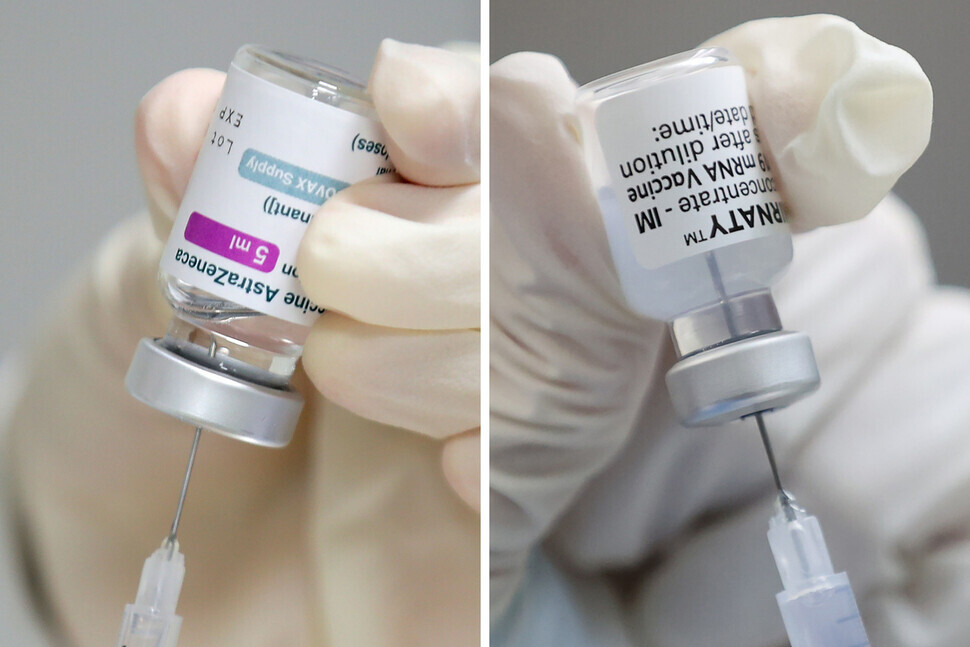hankyoreh
Links to other country sites 다른 나라 사이트 링크
S. Korea to launch mix-and-match trial of COVID-19

As countries around the world conduct research on the safety and efficacy of mixing COVID-19 vaccines, the South Korean government has decided to run a clinical trial in which 500 people are given different vaccines, such as AstraZeneca in the first round and Pfizer in the second round.
Experts believe that vaccine mixing is becoming more necessary given the growing likelihood that COVID-19 will become endemic as the pandemic drags on.
“The Korea National Institute of Health [under the Korea Disease Control and Prevention Agency] is planning to carry out a clinical trial on vaccine mixing by administering the Pfizer vaccine to Koreans who’ve already received the AstraZeneca vaccine,” said Lee Yu-gyeong, head of the South Korean government’s vaccine analysis team, on Thursday.
“This trial will have a sample of 400-500 people and its findings will serve as basic data for exploring ways to enhance the safety and efficacy of vaccination.”
“We’re currently in the planning and preparatory stage for this trial. We’re not at the stage of talking about the specific time [of the trial],” Lee added.
In addition to domestic research, the vaccine analysis team is also closely monitoring ongoing research into vaccine mixing overseas.
The UK, Italy, Russia, China and other countries are currently conducting clinical trials on vaccine mixing.
The Carlos III Health Institute, a publicly owned agency in Spain, carried out a trial on 670 people aged 18-59 who received an initial dose of the AstraZeneca vaccine, 442 of whom were then administered the Pfizer vaccine as a second dose 8-12 weeks later. The team found that vaccine mixing boosted immunity and did not pose any safety risks.
At present, the [South Korean] government does not permit vaccine mixing in principle. While those aged under 30 have been excluded from the AstraZeneca vaccine due to concerns over rare blood clotting side effects, 190,000 people in their 20s who already received the initial dose were still administered a second AstraZeneca vaccine as a follow-up.
Germany and France have even recommended administering an mRNA vaccine such as Pfizer or Moderna as the second dose to some people initially injected with the AstraZeneca vaccine.
Experts believe there is no need to mix vaccines for those who received an initial dose of the AstraZeneca vaccine in Korea, as there has been no official reported cases of blood clotting side effects.
However, viral vector vaccines such as Janssen and AstraZeneca may be less effective when used in repeated doses, and experts note the growing need for a third booster shot due to the prolonged nature of the COVID-19 pandemic and viral mutations.
Experts agree that a time will come when vaccine mixing is also needed in Korea, so it is essential to conduct research in this area.
“If the efficacy and safety of vaccine mixing is proven in clinical research, we would be able to devise a broader range of strategies in the event that a third booster shot becomes necessary due to a reduced antibody effect in people who received second doses,” said Uhm Joong-sik, professor of medicine at Gachon University Gil Hospital. “From the perspective of preparing for a long war of attrition, research into vaccine mixing is essential.”
Jung Jae-hun, professor of preventive medicine at Gachon University School of Medicine, also noted that “If a booster shot becomes necessary in the second half of 2021 or early next year, it appears that the use of vaccine mixing will become more widespread from that point onward.”
By Choi Ha-yan, staff reporter
Please direct comments or questions to [english@hani.co.kr]

Editorial・opinion
![[Guest essay] Preventing Korean Peninsula from becoming front line of new cold war [Guest essay] Preventing Korean Peninsula from becoming front line of new cold war](https://flexible.img.hani.co.kr/flexible/normal/500/300/imgdb/original/2024/0507/7217150679227807.jpg) [Guest essay] Preventing Korean Peninsula from becoming front line of new cold war
[Guest essay] Preventing Korean Peninsula from becoming front line of new cold war![[Column] The state is back — but is it in business? [Column] The state is back — but is it in business?](https://flexible.img.hani.co.kr/flexible/normal/500/300/imgdb/original/2024/0506/8217149564092725.jpg) [Column] The state is back — but is it in business?
[Column] The state is back — but is it in business?- [Column] Life on our Trisolaris
- [Editorial] Penalties for airing allegations against Korea’s first lady endanger free press
- [Editorial] Yoon must halt procurement of SM-3 interceptor missiles
- [Guest essay] Maybe Korea’s rapid population decline is an opportunity, not a crisis
- [Column] Can Yoon steer diplomacy with Russia, China back on track?
- [Column] Season 2 of special prosecutor probe may be coming to Korea soon
- [Column] Park Geun-hye déjà vu in Yoon Suk-yeol
- [Editorial] New weight of N. Korea’s nuclear threats makes dialogue all the more urgent
Most viewed articles
- 1[Guest essay] Preventing Korean Peninsula from becoming front line of new cold war
- 2Yoon’s broken-compass diplomacy is steering Korea into serving US, Japanese interests
- 360% of young Koreans see no need to have kids after marriage
- 4[Reporter’s notebook] In Min’s world, she’s the artist — and NewJeans is her art
- 5After 2 years in office, Yoon’s promises of fairness, common sense ring hollow
- 6S. Korean first lady likely to face questioning by prosecutors over Dior handbag scandal
- 7[Column] Why Korea’s hard right is fated to lose
- 8AI is catching up with humans at a ‘shocking’ rate
- 9[Column] The first year of war in Ukraine
- 10‘Weddingflation’ breaks the bank for Korean couples-to-be